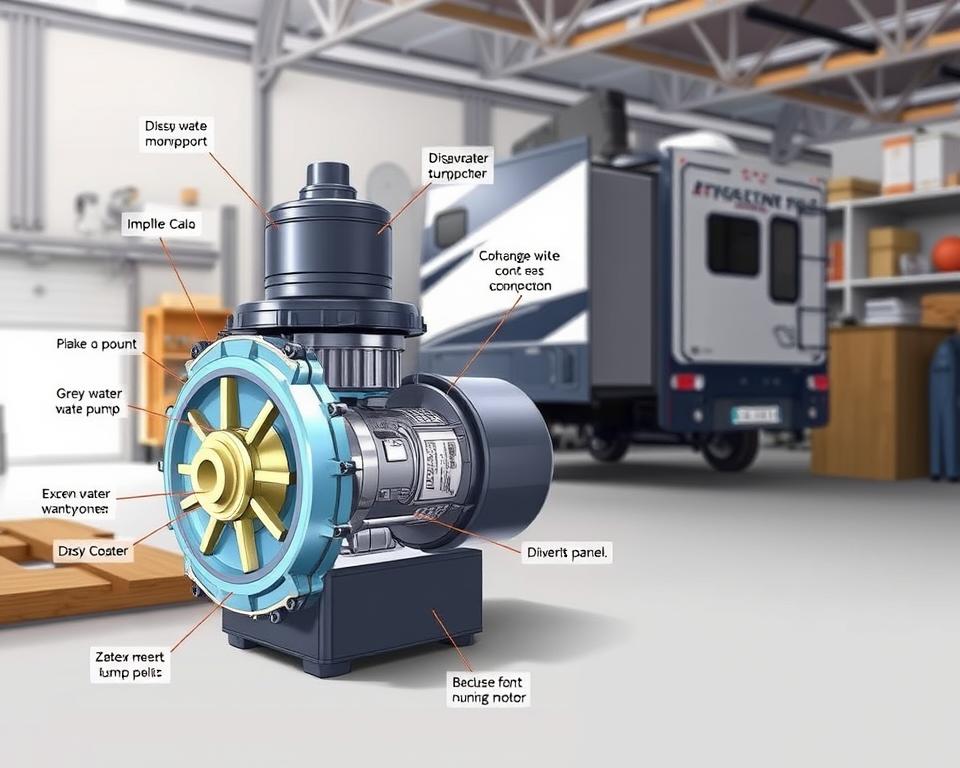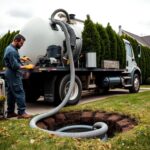Trailer Septic Tank Pumping – Comprehensive Guide
Overlooking a recreational vehicle septic system can rapidly morph into an pricey mistake. For those possessing RVs and mobile units, it’s vital to recognize the importance of RV septic Tank Pumping. It ensures your journeys are hassle-free and living conditions are kept sanitary while on the move. By emphasizing regular RV septic service, this manual is designed to make you proactive in caring for your septic system, get-around potential issues — especially when soaking up the great outdoors.
In this article, thorough instruction into picking dependable mobile septic services is offered. Additionally, discover to identify when your septic Tank calls for immediate attention. Mastering the process for effective RV septic Tank Pumping is also covered. Rather than reacting to issues as they occur, allow this guide to equip you with necessary knowledge. This ensures your RV experiences stay free of concern!
The Importance of Regular RV Septic Tank Pumping
Consistent upkeep of your RV’s septic Tank is essential for its wastewater system’s efficiency. Skipping this can result in clogs and backups, spoiling your vacation and impacting the environment. Sewage leaks from an full Tank can taint the area, creating major hazards.
Choosing professional Pumping services like All in Sanitation is a smart move for trailer owners. This action avoids issues and extends your system’s functionality and longevity. Timely Pump-outs mean a safer, safer environment in RV parks and campgrounds.
Understanding Your Trailer’s Septic System
A motorhome septic system is made up of three primary elements: the black water Tank, grey water Tank, and fresh water Tank. For RV owners, it’s critical to know these parts. They are key in waste management. The black water Tank captures toilet sewage, while the grey water Tank retains water from sinks and showers.
Each Tank has a specific role in ensuring the trailer clean and operational. Checking the levels in the black water and grey water Tanks is vital. It helps avoid overflows, bad smells, and damage to the septic system.
To clarify, below is a table that lays out differences between the black water and grey water Tanks:
| Feature | Black Water Tank | Grey Water Tank |
|---|---|---|
| Purpose | Stores sewage waste | Collects wastewater from sinks and showers |
| Maintenance Frequency | Requires scheduled Pumping | Needs less frequent emptying |
| Potential Issues | Odors, blockages from solids | Risk of grease buildup |
| Typical Size | Generally bigger than grey water Tank | Smaller than black water Tank typically |
Grasping your RV’s septic system is cornerstone for maintenance. It ensures hassle-free travel experiences. Staying mindful of both Tanks equals trips with zero septic concerns.

Red Flags Your Septic Tank Needs Pumping
It’s essential to recognize when your septic Tank needs Pumping to maintain your system functional. Detecting issues early can prevent major repairs and environmental harm. Common signs that demand attention include:
- Slow draining sinks, which may suggest a full Tank or clog.
- Gurgling toilets, indicating blocked pipes or a failing septic system.
- Foul odors around your trailer, an early warning of rising sewage.
- Pooling water near the drain field, suggesting that your Tank may be overwhelmed.
- Sewage backups in your toilets or drains, a clear sign prompt action is needed.
Being mindful of these signs empowers RV owners to take quick action, preventing grave issues. Keeping tabs on your system and responding to these indicators can prolong your septic system’s lifespan. This approach delivers a smoother trailer experience.
Factors Affecting Pumping Frequency
A septic Tank’s volume greatly determines how often it demands Pumping. Larger Tanks need more spread-out service because they hold more waste, whereas smaller Tanks require more regular Pumping.
The campers present using the septic system also affects Pumping frequency. With more RVs, the system experiences greater strain, necessitating quicker Pumping. Notably through peak seasons, altering the schedule is vital to avoid problems.
Here is a table that outlines recommended Pumping intervals based on typical scenarios:
| Septic Tank Size | Number of RVs | Recommended Pumping Frequency |
|---|---|---|
| 500 gallons | 1-2 RVs | Roughly every 2-3 years |
| 1000 gallons | 2-4 RVs | Roughly 3-5 years |
| 1500 gallons | 4+ RVs | Every 1-2 years |
Thoughtfully determining your septic Tank’s Pumping frequency boosts its operation. It also extends its life and efficiency. This choice is vital for maintaining system health.
Finding a Reliable Septic Pumping Service
Choosing a reliable septic Pumping service is essential for your trailer’s septic system health. It ensures prompt and effective Pumping, preventing costly future repairs. When searching for a septic service provider, focus on these important aspects:
- Experience: Prefer companies with a proven track record. Their experience with various septic systems, especially those for mobile rigs, is paramount.
- Customer Reviews: Read online reviews and testimonials. Positive feedback and strong ratings are signs of a dependable provider.
- Response Time: Fast response times demonstrate a company’s focus to their customers and willingness to meet their needs efficiently.
- Knowledge of Systems: Exceptional knowledge of trailer septic systems elevates some services. Providers like All-In Sanitation know these systems well, enabling bespoke service.
Focus on these considerations to secure the most appropriate service for your septic requirements. A dependable septic Pumping service improves your system’s life and performance, allowing for carefree travel adventures.
Trailer Septic Tank Pumping: How It Works
Trailer septic Tank Pumping follows critical steps for efficiency and safety. It’s crucial for RV owners to understand this process before service appointments.
A technician with a trailer-mounted Pump arrives first, suited for mobile systems. This technology enables effective waste removal while defending the environment. They attach the Pump to the rig’s system with a hose reaching the Tank.
The Pump then removes the waste out of the Tank. This action is critical to keep the septic system healthy and prevent overflow. After emptying, the technician assesses the Tank for damage or wear, ensuring proper function.
Following the Pump-out, waste disposal is the next step. The hauled waste is taken to treatment facilities for safe processing. This step limits environmental harm.
The process gains from the trailer-mounted Pump’s effectiveness. Consistent service cuts time and cost, maintaining the septic system in prime condition.
Urgent Septic Pumping Services
Unexpected issues with your septic system can necessitate prompt intervention. For RV enthusiasts, recognizing when to get emergency septic Pumping is critical to avert further damage and excessive costs. Situations needing immediate septic Tank Pumping include backups, unpleasant smells, and sewage leaks. Rapidly handling these issues often requires septic Tank Pump and haul services to effectively eliminate waste and restore system functionality.
Providers like All-In Sanitation provide 24/7 emergency septic Pumping, assuring help is always available when urgently needed. Acting fast with these services notably boosts your septic system’s lifespan and performance. Having a trusted septic service on speed dial can mitigate expenses and stress in emergencies, ensuring uninterrupted enjoyment of RV adventures.
Smart Moves for Caring for Your Trailer Septic System
Keeping your trailer’s septic system in peak shape is crucial. Proper maintenance strategies can sidestep pricey problems later. Kick off with regular checks for damage, leaks, or strange smells for RV septic Tank care.
Proper waste disposal is key for a healthy system. Don’t flush items that won’t break down, and use septic-friendly products. It’s essential that everyone knows how their actions impact the septic system. This guarantees it is kept functional and efficient.
- Conduct periodic checks for leaks and unusual odors.
- Keep contact with your septic service provider for timely maintenance.
- Utilize septic-safe toilet paper and cleaning supplies.
- Avoid pouring chemicals down the drain that could harm the balance of bacteria in the Tank.
- Plan for annual professional inspections to catch potential issues early.
Following these steps helps RV owners extend their RV septic systems’ life and performance.
Common Issues with RV Septic Systems
Mobile septic systems often experience issues that annoy RV owners. Solve these issues early to avoid bigger problems later. Clogs in septic Tanks are typical, mainly due to not disposing of waste properly. To prevent clogs, stick with RV-safe toilet paper and perform regular maintenance.
Another major issue is odor control. Bad smells can point to backups or leaks, demanding immediate action. To cut odors, make sure the system is properly vented and the septic Tank is emptied regularly.
Leaks can develop from wear or incorrect installations. Swift identification of leaks aids avoiding environmental damage and keeps the system working. Regular inspections are important to find these issues early.
To get ahead of common issues, implement preventative strategies like regular care and proper waste disposal. Prepared and proactive RV owners can enjoy their travels stress-free and with peace of mind.
Wrapping It Up
Understanding trailer septic Tank Pumping is crucial for RV and camper owners. Regular maintenance and noticing trouble signs in your septic system can improve your RVing experience immensely. Managing your RV’s septic system well ensures both safety and comfort during your outdoor adventures.
Choosing a reliable service for your trailer’s septic Tank Pumping is critical. Engaging experts like All in Sanitation secures your mobile waste management is first-rate. This approach is not just green, but it also elevates* the camping experience, making it more enjoyable and sustainable.
Actively maintaining your septic system minimizes emergencies, enhancing your nature stays. Thorough care and understanding empower memorable trips for the best reasons.

